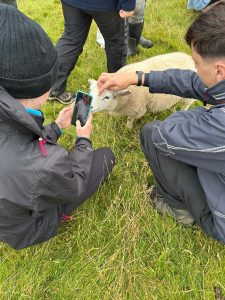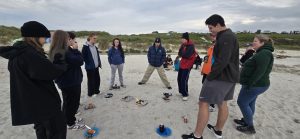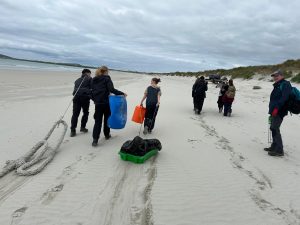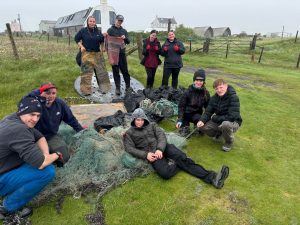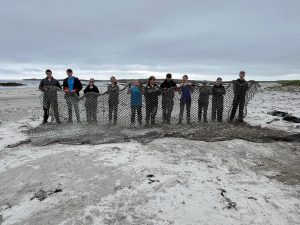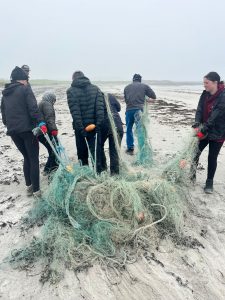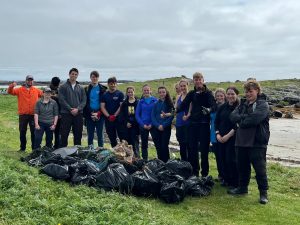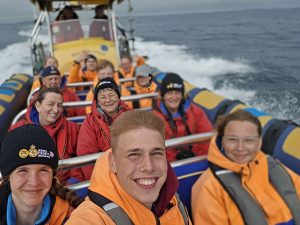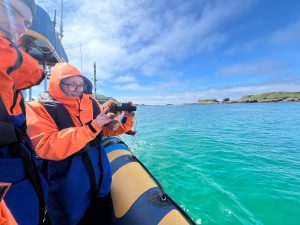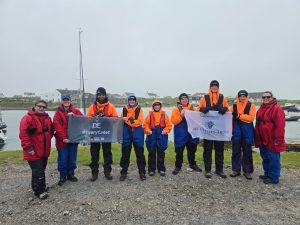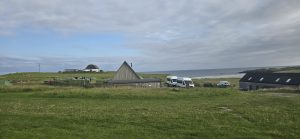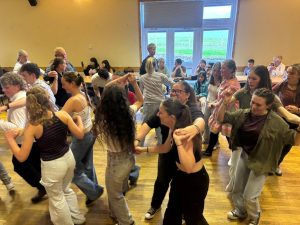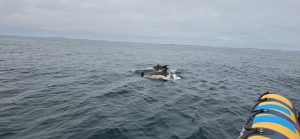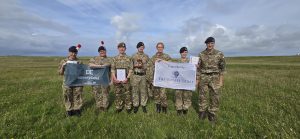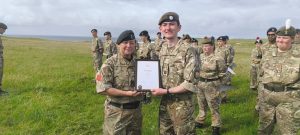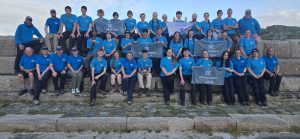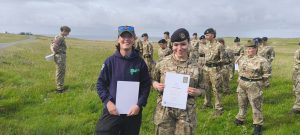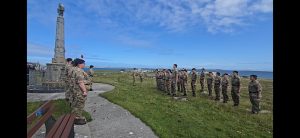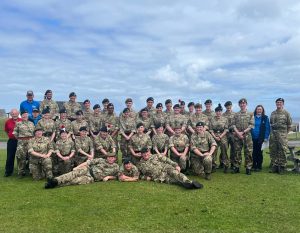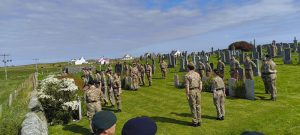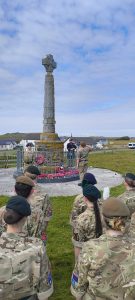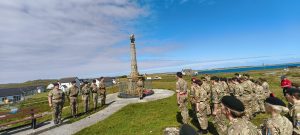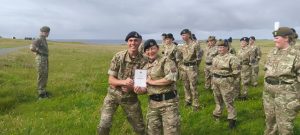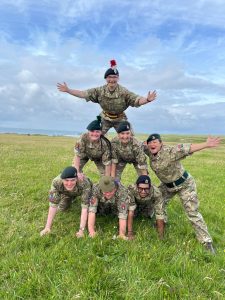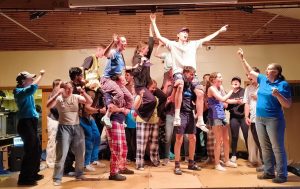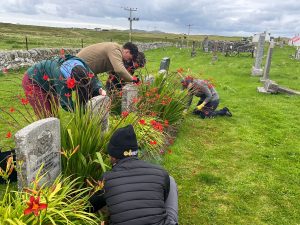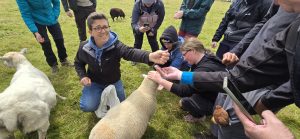In 2024, the first Expedition Tiree Tiger was undertaken. It was planned as an expedition with a difference. An expedition not only to explore and experience a remote island in the Inner Hebrides but also an opportunity to make a positive impact on its environment and community. However, it turned into something much bigger – a journey of growth, connection, and discovery. An expedition of the soul. Expedition Tiree Tiger had such a profound effect on the 26 young adults that attended that Maj Deb Major started planning for Expedition Tiree Tiger 2025 on the journey home!
Maj Deb Major said,
“When an experience is this transformative, you can’t help but want to share it with more young people. To give them the opportunity to not only explore an unfamiliar environment but themselves too.”
And so it was that on 26th July 2025, 27 Army Cadets and two Cadet Force Adult Volunteer DofE participants, from England, Wales, Scotland & Northern Ireland, and 12 Adult Volunteer staff made the two-day journey by minibus and 4-hour ferry crossing to Tiree.
Tiree, a tiny windswept island in Scotland’s Inner Hebrides, displaying colours of a tropical island. With its turquoise seas and white sand beaches, air that smells of salt and a sky that stretches on forever. An island with the power to change you to the core.
Expedition Tiree Tiger aimed:
- To allow the cadets to experience an adventure
- To help the community and environment
- To learn teamwork and powerful lifelong skills
- To achieve their DofE Gold Residential section
- To achieve the John Muir Wild Places Guardian Award
They arrived on Tiree on Monday 28th July, welcomed by the Tiree Ranger, Hayley Douglas waving the Scottish flag. As it happened, this day was also Hayley’s Birthday and so, the night before, the cadets had made two Happy Birthday banners which they hung from the side of the two minibuses as they disembarked the ferry. After a welcome chat from Hayley, they made their way to their home for the week. Sunset Campsite in Balevullin.
The first task was to put up the kitchen and storage tents so that the adults could make lunch. The cadets then worked together to set up their own tents. Chores done, it was time to sit and enjoy lunch with a view, followed by a briefing with Maj Deb Major and the Tiree Ranger, Hayley. And a surprise visit from Dr Claire Harris, one of the two GP partners from Tiree Medical Centre. Doc Claire was an Army Reservist for 5 years. She was a doctor in the 225 Scottish Medical Regiment and came to give advice to some of the cadets who were hoping to become doctors themselves. Dr Claire also joined the cadets on other occasions throughout the week.
The main activity for the week was to walk Tiree’s beaches and clear away all litter and debris as they went. Prior to arriving on Tiree the cadets were offered the opportunity to achieve the John Muir Wild Guardians Award and, of course, they all said yes.
It isn’t an easy award to achieve. Every participant must:
- Spend 25 hours or more completing their John Muir Award – with at least 25 per cent of the time spent on the Conserve activity.
- Have an active involvement in decision making and planning of their Award – this helps to build individuals’ belief that they can make a difference beyond the Award.
- Develop awareness of an inspirational person. This should be an environmentalist, past or present, or someone making a difference to wild places locally. Complete the Four Challenges: Discover, Explore, Conserve, Share.
One parent said,
“Receiving that award gave them a real sense of pride and purpose. It wasn’t just about completing tasks, it was about understanding their impact. The award reinforced the idea that their actions mattered and that they were part of something bigger than themselves”.
They spent time before arriving on Tiree to research four environmentalists and the impacts of plastics and ghost nets to wildlife and the environment and even produced a leaflet about why beach cleaning was important. Over 5 days on Tiree, the 29 participants and the adult staff had achieved over 700hrs of beach cleaning and cleared an amazing six van loads of rubbish. Items included full sized fishing nets, fishing line, a huge amount of plastic, rope, clothing and even a condensed milk tin from Brazil!
Maj Deb Major said,
“Out of all the activities these young adults have undertaken on Tiree, the beach cleaning had a huge impact. We live in a very disposable society, and many people tend to walk around with their eyes closed to the litter that they pass on the ground. People go to the beach because it is a nice place to spend the day but then they get up and walk away, leaving their rubbish where they were sat. What do they think happens to it? Well, a lot of it ends up in the sea. From there it ends up in the stomachs of the marine life or wrapped around the neck of a whale or seal. Or it gets carried with the tide and ends up on beaches hundreds of miles away. One of the cadets called me over to them and holding up a small plastic dip pot, asked if there was a MacDonalds on Tiree. My answer was no. The nearest MacDonalds is in Fort William over 100 miles away”.
Cdt Sgt EB said,
“Thank you so much for this trip. It has been eye-opening to see just how much of our rubbish ends up on the beaches and it has been rewarding to help combat this problem”.
Cdt C/Sgt SR said,
“It has been one of the most eye-opening experiences. I’ve learnt so much about the environment”.
As well as walking Tiree’s beaches, there were lots of other activities carried out. They went on a boat trip with Tiree Sea Tours where they were blessed with a pod of dolphins leaping and swimming around the boat, a visit to a seal colony and a brief visit to Lunga where they saw the puffins. Whilst onboard they learnt about the impact plastics and chemicals have on marine life.
They visited Balemartin Fold to learn about the Highland Cattle and were lucky enough to get up close and personal with these gentle giants. Balemartin Fold was started by a father and his daughter Emily in 2008. When Emily was 12 years old, her father passed away. She decided to continue with the fold and is now, at the age of 19, selling her cattle worldwide and winning lots of trophies for her herd.
They got to hand feed the famous, Wonky the lamb, at Rhoda’s croft where they learnt about the types of sheep on Tiree. Wonky the lamb was born, in a word, wonky. She was flattened in the womb by her very large twin. She struggled to stand and feed but with support from Rhoda, she is now running around and enjoying life and is now only a little bit wonky. Not only did they learn about crofting life on a remote island, but they learnt that it is possible to be successful no matter the challenges or disabilities placed in front of you.
A few hours were also spent clearing ragwort from three large fields. This plant is lethal to the cattle, sheep and horses on the island.
Throughout the week, Hayley shared her wealth of knowledge about the island, its wildlife and the environment. She also took them out searching for otter. Unfortunately, the otter remained elusive, but they did get to see one later in the week.
In the evenings, each team took a turn cooking for everyone. They had a BBQ on the beach, sandcastle competitions and games on the beach. And what camping trip would be complete without S’Mores around the campfire. They were also invited to a family ceilidh. This was a real favourite of everyone, as they got to meet and spend fun time with the community. In addition, they also spent time cleaning the Commonwealth War Graves.
One cadet said,
“The ceilidh was the best by far. It gave us an opportunity to relax and get to know each other. And the Tiree people were so nice, they made us feel like part of their community”.
On the final day, they paid their respects to those from the island who fell in the two world wars at two ceremonies, laying crosses on 24 Commonwealth war graves and a wreath at the island’s memorial. The sounds of a bugler and a Scottish piper echoing around the island made the moment more poignant.
“I feel privileged to have been able to participate in such a moving ceremony,” said Cdt S/Sgt EF.
After the remembrance ceremonies it was back to the campsite to celebrate their achievements. All participants achieved their Gold DofE Residential, and the John Muir Wild Places Guardian Award and three cadets completed their Gold Award.
This was to be their last activity on Tiree as they were catching the ferry back to Oban in the morning. However, Storm Floris had other ideas!
Maj Deb Major said,
“I found out that our ferry had been cancelled just before we were due to present the certificates. I made the decision to let the cadets enjoy the well-earned celebration of their achievements before I told them the news, as I knew that those that struggled with anxiety would start to worry. The team and I were aware earlier in the day that it was highly probable that we would not make it off the island and the emergency plan was put into action earlier that day, thanks to the Tiree Ranger and Tiree Council. When I told them, there was silence initially and a few worried expressions. I explained to them that we would be packing down the campsite and moving to the community centre where we would wait out the storm. I told them that we had no control over the situation but that we did control how we dealt with it. We could sit and worry for the next 24-48hrs, or we could enjoy the extra time that we had on Tiree. Of course they chose the latter”.
Word had spread across the Tiree community that we were moving into the community centre. On our arrival freshly baked lemonade scones were waiting as well as games, puzzles and sweets.
Maj Deb Major said,
“It made me think of the quote often used by our Ambassador, Sally Orange MBE, ‘when life throws you lemons’ but instead of making lemonade, Tiree makes lemonade scones!”.
The following morning, they decided it would be a pyjama day as they wouldn’t be going outside. Whilst Storm Floris blew 86mph outside, inside the day was spent playing games, learning Scottish dancing, the speed of these dances giving Storm Floris competition, and in the evening, Tiree’s Got Talent. Everyone got involved, including the staff who put on a perfect performance of YMCA.
At 1900hrs on Tuesday 5th August the ferry finally arrived and after a nail-biting hour on standby, they boarded to start the first leg of their journey home. All cadets and staff finally made it home by 2300hrs on Wednesday 6th August.
The cadets aged 16 -18, and the two CFAV aged 19, came from diverse backgrounds and all parts of the UK. Some suffered with anxiety, some with low self-confidence. For some, their anxiety almost stopped them from attending as they were fearful of being in a strange environment with people they did not know, and a long way from home. Just the act of getting to Tiree was a huge achievement for them.
But again, Tiree worked its magic. It brought quiet to the busiest mind and peace to the most anxious. Its beauty caused phones to be put in pockets and verbal conversations to begin. What started as 29 diverse individuals became a unit of one, whose strength lied in their differences.
Quotes from cadets about their Tiree adventure.
“This experience has made me reflect on my own lifestyle by being outside and not glued to my mobile”
“This trip will greatly help me transition into university life”
“I enjoyed making friends during my time on Tiree, which I sometimes struggles to do”
“I have been very worried about going to uni and being away from home and meeting new people, but I’m not at all worried now. I know that I can do it, and I know that I can make new friends in a short space of time”
Several cadets said,
“This has been my best cadet experience ever!”
Each cadet was expected to contribute £100 towards the cost of the £600 per person adventure. Fortunately, the bulk of the money was made up of grants and private donations – without which the trip would not have been possible.
Many cadets said that without the grant funding, they would not have been able to come.
One parent of twins said,
“I couldn’t have sent even one child if the full cost had been £600 and definitely not both. That would have made the trip inaccessible to our family, and we would have had to decline the opportunity. The grant funding makes all the difference – not just for us, but for every cadet who takes part. It means that regardless of background or financial situation, everyone contributes equally, no one is excluded, and the focus is on the experience, not the cost”.
And will there be a Tiree Tiger 2026? Maj Deb Major said,
“Absolutely! The adult team have already booked their holidays from work for next year. New activities have been planned, and the campsite is booked. As adults, we have seen first hand the real impact this experience has. I don’t just mean the obvious things like making new friends, teamwork etc. I mean watching those cadets who, on day one, sit six chairs away from anyone else with their head down because they are shy or have no confidence, become the most popular person in the group and walk around with their heads high. Or watching the fear in a young adult’s eyes caused by anxiety, disappear when they realise that they can achieve something that they believed they couldn’t. Tiree gives them all the environment to be who they are and not who they think society wants them to be. It allows them to simply be. So yes, I will do everything I can to give this opportunity to more young adults”.
Interview with a parent – Katrina D, the mother of twin boys Oliver & Noah.
What impact do you think the event had on the boys?
“As a parent of twins who took part, I can honestly say the experience was transformative. Over 12 days, they were immersed in nature, community service, and shared adventure with cadets from across the UK, many of whom they’d never met before. The activities were varied and meaningful with beach cleaning, wildlife spotting, ragwort clearing, livestock handling, ceilidh dancing, and a memorial parade. But it was the unexpected storm at the end of the trip that revealed their growth. When travel plans were cancelled, the group broke camp and relocated to the community hall. Instead of letting the disruption dampen their spirits, they came together with “Tiree’s Got Talent.”
“Watching my boys take part was a proud moment for me. It was in that impromptu talent show that I saw just how much they’d grown. They weren’t just participants in a programme; they were part of a team, comfortable and thriving in the company of new friends.
“In short, they came back with knowledge, more confident, more thoughtful and more aware of the world around them. It was the kind of growth you hope for as a parent but rarely get to see.”
What changes did you notice in the boys during and after the event?
“When I dropped the twins off at Bicester, I could feel their nerves as we said goodbye, and I’ll admit, it made me anxious too. It’s never easy watching your children step into the unknown, especially surrounded by unfamiliar faces and heading off to a remote island for nearly two weeks. But as the days went on, I began to see a shift. They were taking part in every activity, even the ones that I knew were outside their comfort zone. They didn’t shy away but leaned in, and that, to me, was incredibly important.
“One of the most memorable moments for me came when the twins got up and sang together for “Tiree’s got Talent”. Watching the video, I could see the nerves but, more than that, I saw them supporting one another. That performance was a quiet triumph and I’m not sure they would have done it if they hadn’t been gaining confidence from previous events during the trip.
“After the event, I noticed a real shift in one of my sons. His mindset about life at home had changed as he realised, he was capable of more than he’d thought, and that he didn’t need to rely on familiar surroundings or the same people to feel secure. That kind of self-awareness and independence is something no classroom can teach.”
This event, without the grant funding, should have cost around £600 per cadet. Would you have been able to send them if this had been the cost?
“Honestly, no. I don’t think I could have sent even one child if the full cost had been £600 and definitely not both. That would have made the trip inaccessible to our family, and we would have had to decline the opportunity.
“The grant funding makes all the difference – not just for us, but for every cadet who takes part. It means that regardless of background or financial situation, everyone contributes equally, no one is excluded, and the focus is on the experience, not the cost.”
What would you like to say to The Ulysses Trust and those that donate to them to enable events like this to happen?
“I am genuinely grateful to The Ulysses Trust and all those who financially support them. Your generosity doesn’t just fund a trip; it opens doors to experiences that really shape young people in ways that are hard to put into words. You are investing in their growth and making it possible for families like mine to say yes to opportunities that would otherwise be out of reach.
“Because of your support, my twins were able to take part in a residential that challenged them, inspired them, and helped them grow. And this wasn’t just a tick box for their Gold D of E Award. It was so much more than that! This was a chance to discover who they are outside of their usual environment, to build resilience, and to form genuine connections with others. It was an experience that will stay with them for life.
What did the boys think about the trip?
They absolutely loved it! Looking back, I think they were both surprised by how much they enjoyed themselves and what they got out of the experience, especially considering how nervous they were when I dropped them off. They spoke about the sense of adventure, the friendships they made, and how much they learned – not just about the environment and community, but about themselves. They were proud of the work they did, and those moments of reflection really stayed with them.
“One of the highlights they talked about was singing together, but they both also noticed how different it was to be surrounded by people with similar goals, in both the other cadets and the islanders. They came home tired, windswept, and full of stories. I could tell they felt proud. This wasn’t just a fun trip. It was meaningful, memorable, and something I think they’ll carry with them for a long time.”

